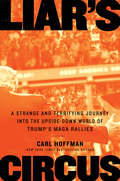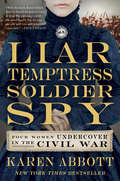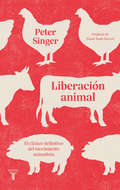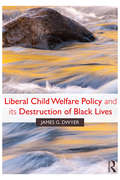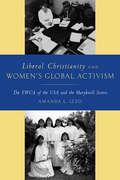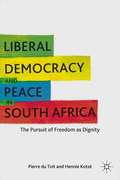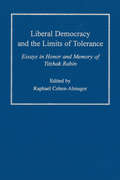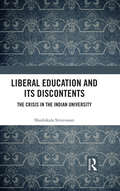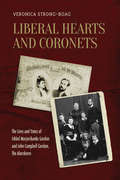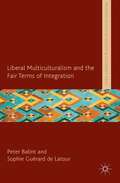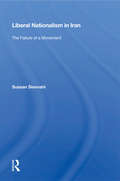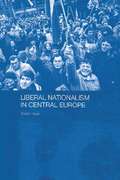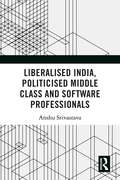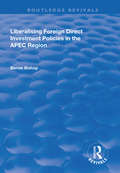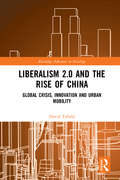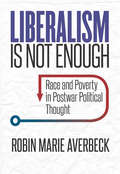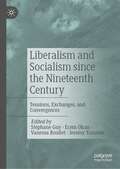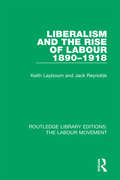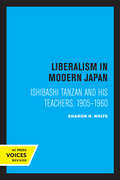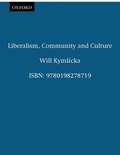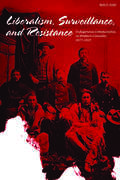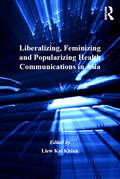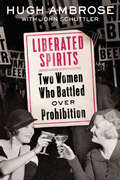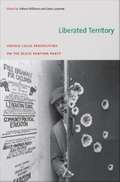- Table View
- List View
Liar's Circus: A Strange and Terrifying Journey Into the Upside-Down World of Trump's MAGA Rallies
by Carl Hoffman"A brilliant, riveting, funny, terrifying journey into the beating heart of Trumpland." —Liza Mundy, author of Code GirlsIn this daring work of immersive journalism, based on hundreds of hours of reporting, Carl Hoffman journeys deep inside Donald Trump’s rallies, seeking to understand the strange and powerful tribe that forms the president’s base. Hoffman, who has written about the most dangerous and remote corners of the world, pierced this alternate society, welcomed in and initiated into its rites and upside-down beliefs, and finally ushered to its inner sanctum. Equally freewheeling and profound, Liar’s Circus tracks the MAGA faithful across five thousand miles of the American heartland during a crucial arc of the Trump presidency stretching from the impeachment saga to the dawn of the coronavirus pandemic that ended the rallies as we know it.Trump’s rallies are a singular and defining force in American history—a kind of Rosetta stone to understanding the Age of Trump. Yet while much remarked upon, they are, in fact, little examined, with the focus almost always on Trump’s latest outrageous statement. But who are the tens of thousands of people who fill these arenas? What do they see in Trump? And what curious alchemy—between president and adoring crowd—happens there that might explain Trump’s rise and powerful hold over both his base and the GOP?To those on the left, the rallies are a Black Mass of American politics at which Trump plays high priest, recklessly summoning the darkest forces within the nation. To the MAGA faithful, the rallies are a form of pilgrimage, a joyous ceremony that like all rituals binds people together and makes them feel a part of something bigger than themselves. Both sides would acknowledge that this traveling roadshow is the pressurized, combustible core of Trump’s political power, a meeting of the faithful where Trump is unshackled and his rhetoric reaches its most extreme, with downstream consequences for the rest of the nation.To date, no reporter has sought to understand the rallies as a sociological phenomenon examined from the bottom up. Hoffman has done just this. He has stood in line for more than 170 hours with Trump's most ardent superfans and joined them at the very front row; he has traveled from Minnesota to Texas, Louisiana, Mississippi, and New Hampshire immersing himself in their culture. Liar’s Circus is a revelatory portrait of Trump’s America, from one of our most intrepid journalists.
Liar, Temptress, Soldier, Spy: Four Women Undercover in the Civil War
by Karen AbbottKaren Abbott, the New York Times bestselling author of Sin in the Second City and “pioneer of sizzle history” (USA Today), tells the spellbinding true story of four women who risked everything to become spies during the Civil War.Karen Abbott illuminates one of the most fascinating yet little known aspects of the Civil War: the stories of four courageous women—a socialite, a farmgirl, an abolitionist, and a widow—who were spies.After shooting a Union soldier in her front hall with a pocket pistol, Belle Boyd became a courier and spy for the Confederate army, using her charms to seduce men on both sides. Emma Edmonds cut off her hair and assumed the identity of a man to enlist as a Union private, witnessing the bloodiest battles of the Civil War. The beautiful widow, Rose O’Neale Greenhow, engaged in affairs with powerful Northern politicians to gather intelligence for the Confederacy, and used her young daughter to send information to Southern generals. Elizabeth Van Lew, a wealthy Richmond abolitionist, hid behind her proper Southern manners as she orchestrated a far-reaching espionage ring, right under the noses of suspicious rebel detectives.Using a wealth of primary source material and interviews with the spies’ descendants, Abbott seamlessly weaves the adventures of these four heroines throughout the tumultuous years of the war. With a cast of real-life characters including Walt Whitman, Nathaniel Hawthorne, General Stonewall Jackson, detective Allan Pinkerton, Abraham and Mary Todd Lincoln, and Emperor Napoleon III, Liar, Temptress, Soldier, Spy draws you into the war as these daring women lived it.Liar, Temptress, Soldier, Spy contains 39 black & photos and 3 maps.
Liberación animal: El clásico definitivo del movimiento animalista
by Peter SingerLa Biblia de quienes luchan por los derechos de los animales, con prólogo de Yuval Harari. Este revolucionario libro inspiró, desde su publicación original en 1975, un movimiento mundial de defensa de los derechos de los animales que aspira a transformar nuestra actitud hacia ellos y eliminar la crueldad que les infligimos. En Libración animal, Peter Singer denuncia el «especismo» (el prejuicio de creer que existe una especie, la humana, superior a todas las demás) y expone la escalofriante realidad de las granjas industriales y los procedimientos de experimentación con animales, echando abajo las justificaciones que los defienden y ofreciendo alternativas a un dilema moral, social y medioambiental. Este libro es un persuasivo llamamiento a la conciencia, la decencia y la justicia y una lectura esencial tanto para el ya convencido como para el escéptico. La crítica ha dicho...«La documentación deSinger no es ni retórica ni emocional, sus argumentos son rigurosos y formidables, ya que no basa su caso en principios personales o religiosos, ni en conceptos filosóficos altamente abstractos, sino en posiciones morales que la mayoría de nosotros ya aceptamos.»The New York Times Book Review «Un libro importantísimo que cambiará el modo en que muchos de nosotros miramos a los animales y, en última instancia, a nosotros mismos.»Chicago Tribune
Liberal Child Welfare Policy and its Destruction of Black Lives
by James G. DwyerHow can we end the inter-generational cycle of poverty and dysfunction in the US's urban ghettos? This ground-breaking and controversial book is the first to provide a child-centered perspective on the subject by combining a wealth of social science information with sophisticated normative analysis to support novel reforms—to child protection law and practice, family law, and zoning— that would quickly end that cycle. The rub is that the reforms needed would entail further suffering and loss of liberty for adults in these communities, and liberal advocacy organizations and academics are so adult-centered in their sympathies and thinking that they reflexively oppose any such measures. Liberals have instead promoted one ineffectual parent-focused program after another, in an ideologically-driven quest for the magic pill that can save both adults and children in these communities at the same time. This `insider critique’ of liberal child welfare policy reveals a dilemma that liberals have yet to face squarely: there is an ineradicable conflict of interests between many young children and their parents, especially in areas of concentrated poverty, and one must choose sides. It is a must read for legal academics, political scientists, urban policy experts, as well as professionals working in social work, law, education, urban planning, legislative offices, and administrative agencies.
Liberal Christianity and Women's Global Activism: The YWCA of the USA and the Maryknoll Sisters
by Amanda IzzoReligiously influenced social movements tend to be characterized as products of the conservative turn in Protestant and Catholic life in the latter part of the twentieth century, with women's mobilizations centering on defense of the “traditional” family. In Liberal Christianity and Women’s Global Activism, Amanda L. Izzo argues that, contrary to this view, liberal wings of Christian churches have remained an instrumental presence in U.S. and transnational politics. Women have been at the forefront of such efforts. Focusing on the histories of two highly influential groups, the Young Women’s Christian Association of the USA, an interdenominational Protestant organization, and the Maryknoll Sisters, a Roman Catholic religious order, Izzo offers new perspectives on the contributions of these women to transnational social movements, women’s history, and religious studies, as she traces the connections between turn-of-the-century Christian women’s reform culture and liberal and left-wing religious social movements of the 1960s and 1970s. Izzo suggests that shared ethical, theological, and institutional underpinnings can transcend denominational divides, and that strategies for social change often associated with secular feminism have ties to spiritually inspired social movements.
Liberal Democracy and Peace in South Africa
by Pierre Du Toit Hennie KotzéSouth Africa's transition to democracy was met by the global audience with at first, disbelief, followed later by applause. After fifteen years of democracy big questions remain: has a more democratic regime also lead to a more liberal society? And has democracy made for a more peaceful society?
Liberal Democracy and the Limits of Tolerance: Essays in Honor and Memory of Yitzhak Rabin
by Raphael Cohen-AlmagerAn irony inherent in all political systems is that the principles that underlie and characterize them can also endanger and destroy them. This collection examines the limits that need to be imposed on democracy, liberty, and tolerance in order to ensure the survival of the societies that cherish them. The essays in this volume consider the philosophical difficulties inherent in the concepts of liberty and tolerance; at the same time, they ponder practical problems arising from the tensions between the forces of democracy and the destructive elements that take advantage of liberty to bring harm that undermines democracy. Written in the wake of the assasination of Yitzhak Rabin, this volume is thus dedicated to the question of boundaries: how should democracies cope with antidemocratic forces that challenge its system? How should we respond to threats that undermine democracy and at the same time retain our values and maintain our commitment to democracy and to its underlying values? All the essays here share a belief in the urgency of the need to tackle and find adequate answers to radicalism and political extremism. They cover such topics as the dilemmas embodied in the notion of tolerance, including the cost and regulation of free speech; incitement as distinct from advocacy; the challenge of religious extremism to liberal democracy; the problematics of hate speech; free communication, freedom of the media, and especially the relationships between media and terrorism.
Liberal Education and Its Discontents: The Crisis in the Indian University
by Shashikala SrinivasanWhat explains the peculiar trajectory of the university and liberal education in India? Can we understand the crisis in the university in terms of the idea of education underlying it? This book explores these vital questions and traces the intellectual history of the idea of education and the cluster of concepts associated with it. It probes into the cultural roots of liberal education and seeks to understand its scope, effects and limits when transplanted into the Indian context. With an extensive analysis of the philosophical writing on the idea of university and education in the West and colonial documents on education in India, the book reconstructs the ideas of Gandhi and Tagore on education and learning as a radical alternative to the inherited, European model. The author further reflects upon how we can successfully deepen liberal education in India as well as construct alternative models that will help us diversify higher learning for future generations. Lucid, extensive and of immediate interest, this book will be useful for scholars and researchers interested in the history and philosophy of education and culture, social epistemology, ethics, postcolonial studies, cultural studies and public policy.
Liberal Hearts and Coronets
by Veronica Strong-BoagScottish aristocrats John Campbell Gordon (1847-1934) and Ishbel Marjoribanks Gordon (1857-1939), known as the Aberdeens, rejected both revolution and reaction in their political careers. The aristocratic progressivism and egalitarian marriage of these fervent liberals confounded both contemporaries and historians. John, as viceroy of Ireland and governor-general of Canada, was a notable ally of feminists, workers, and Irish Home Rulers. Ishbel, his viceregal companion and the long-time president of the International Council of Women, was a liberal feminist and Home Ruler whose commitments stirred up even more controversy.Superbly written and informed by decades of research, Liberal Hearts and Coronets is the first biography to treat John Campbell Gordon as seriously as his better-known wife. Examining the Aberdeens' remarkable careers as landlords, philanthropists, and international progressives, Veronica Strong-Boag casts the twilight of the British aristocracy in an entirely new light.
Liberal Multiculturalism and the Fair Terms of Integration
by Peter Balint Sophie Gu�rard de LatourMulticulturalism has come under considerable attack in both political practice and political theory. Yet the fact of diversity remains, and with it the need to establish the fair terms of integration in contemporary liberal societies. In examining liberal multiculturalism an approach that has been variously criticised as either too liberal or too multicultural this book both defends liberal multiculturalism as a coherent and practicable political theory, while also suggesting it is not without the need for reformulation. Key questions that need addressing concern the importance and role of national identities and other forms of social solidarity, compatibility with anti-discrimination measures, nature of language rights, and the unavoidability of essentialism. This collection explores these challenges whilst remaining grounded in real word contexts and issues. "
Liberal Nationalism In Iran: The Failure Of A Movement
by Sussan SiavoshiThis book examines the rise and fall of the liberal nationalist movement in Iran. It provides an analysis of the National Fronts' successes and failures, focusing on their interactions with both the other contenders, including the government and international factors. .
Liberal Nationalism in Central Europe
by Stefan AuerAfter the collapse of communism there was a widespread fear that nationalism would pose a serious threat to the development of liberal democracy in the countries of central Europe. This book examines the role of nationalism in post-communist development in central Europe, focusing in particular on Poland, the Czech Republic and Slovakia. It argues that a certain type of nationalism, that is liberal nationalism, has positively influenced the process of postcommunist transition towards the emerging liberal democratic order.
Liberal Racism
by Jim Sleeperthis is a tough-minded, provocative indictment of the failure of liberalism in the post-Civil Rights era. As Sleeper sees it, liberals once held the moral high ground because they "fought nobly to help this country rise above color." Now, however, liberals have become blinded by race and have abandoned the fight to create what Sleeper calls the "transracial belonging and civic faith for which Americans of all colors so obviously yearn." Much of what Sleeper has to say here flies in the face of politically correct received wisdom about race, but as an effort to remind Americans that all of us are fundamentally responsible for our fates, this is a much-needed corrective to race-based thinking that has proven unproductive.
Liberalised India, Politicised Middle Class and Software Professionals
by Anshu SrivastavaThis volume explores the emergence, evolution and definition of the middle class in India. As a class created as the interpreters between the colonial rulers and the millions whom they governed in the pre-Independence era, the Indian middle class has existed in congruence with the state, occupying vital positions in state administration. Since Independence, this middle class underwent major sociological change as they live independent of the state, which affected their social, economic and political position, reaping benefits of liberalisation and globalisation through education and employment. An otherwise internally differentiated and heterogeneous group, the new Indian middle class often unifies itself to shape socio-political discourse that affects politics and policymaking, from domestic to international affairs. This volume analyses this class phenomenon through a close study of a new metropolitan middle class in India – the software professionals, emblematic of the 'new India’. It discusses this emerging class as a political category and their engagements with the state, democracy, political parties, issues of gender, basic necessities and social justice. Further, it discusses their social action and ‘middle class activism’ for issues such as environment, cleanliness and corruption, particularly highlighting its presence in the private sector and electronic media. A fresh perspective on India’s political milieu, this volume will be of interest to scholars and researchers of sociology, modern Indian history, political science, economics and South Asia studies.
Liberalising Foreign Direct Investment Policies in the APEC Region (Routledge Revivals Ser.)
by Bernie BishopThis title was first published in 2001. This work is a response to criticisms that investment liberalization in the APEC region is not moving quickly enough. It commences with a historical overview of APEC's process for investment liberalization and a description of current foreign direct investment policies for each of the APEC economies. It then argues that there are significant constraints to further liberalization arising from economic development concerns in the developing countries and political considerations in both developed and developing countries in the region. It also suggests that a truly liberalized investment environment would involve the removal of investment incentives. Again, there are political and institutional reasons that make this difficult. With several suggestions for further research that should better inform policy makers, this is an informative insight into the complex issues involved in the liberalization process in the APEC region.
Liberalism 2.0 and the Rise of China: Global Crisis, Innovation and Urban Mobility (Routledge Advances in Sociology)
by David TyfieldWhat can we do in this period of historic, global turbulence? Mainstream narratives have no plausible account of how to stop exacerbating the multiple, overlapping challenges; much less begin to address them meaningfully. The only thing everyone agrees is innovation will be needed. But what is innovation? Usually, it is understood as new technologies that will ‘solve’ specific ‘problems’ – and, it is hoped, return life to a ‘business as usual’ of progress in individual freedom and wealth. But innovation is a thoroughly social process with profound implications for the arrangement of power in a society, hence shaping the emergence of new social systems. Exploring evidence from the key arenas of low-carbon innovation, including in the pivotal location of a rising China, this book describes the global systemic crisis of a neoliberal world order and the embryonic emergence of an alternative global power regime of a ‘liberalism 2.0’. This augurs both a web 2.0-based revitalization of the classical liberalism of the nineteenth century and new Dickensian inequalities and injustices. Against hopes that the present is a ‘revolutionary’ moment, therefore, political engagement with this emerging power regime is thus presented as the most productive strategy for a progressive twenty-first century politics.
Liberalism Is Not Enough: Race and Poverty in Postwar Political Thought
by Robin Marie AverbeckIn this intellectual history of the fraught relationship between race and poverty in the 1960s, Robin Marie Averbeck offers a sustained critique of the fundamental assumptions that structured liberal thought and action in postwar America. Focusing on the figures associated with "Great Society liberalism" like Daniel Patrick Moynihan, David Riesman, and Arthur Schlesinger Jr., Averbeck argues that these thinkers helped construct policies that never truly attempted a serious attack on the sources of racial inequality and injustice.In Averbeck's telling, the Great Society's most notable achievements--the Civil Rights Act and the Voting Rights Act--came only after unrelenting and unprecedented organizing by black Americans made changing the inequitable status quo politically necessary. And even so, the discourse about poverty created by liberals had inherently conservative qualities. As Liberalism Is Not Enough reveals, liberalism's historical relationship with capitalism shaped both the initial content of liberal scholarship on poverty and its ultimate usefulness to a resurgent conservative movement.
Liberalism and Socialism since the Nineteenth Century: Tensions, Exchanges, and Convergences
by Vanessa Boullet Stéphane Guy Ecem Okan Jeremy TranmerThis book aims to re-evaluate the relations between two major ideologies that have been increasingly contested in recent years, yet continue to be invoked or rejected as foundational systems for political thought or action. With socialism conceiving of itself as an alternative to economic liberalism, the two systems of thought emerged partially in opposition to each other. However, this book seeks to redefine their specificities and the way in which they have not only opposed each other but drew on common notions or paradigms to become both competing and complementary systems of thought and practices. With contributions from eminent political scientists and historians of political and economic thought, the book examines how the polarisation of debates and politicisation of concepts such as property, freedom, the individual, or the State, serve to construct the adversary and form a basis for political commitment. Offering an interdisciplinary assessment of the relation between liberalism and socialism, the authors help to make sense of current debate on individual freedom, political obligation and the changing role of the State. Providing an innovative perspective, this edited collection will be of interest to scholars and students researching political and economic thought, history or science, as well as anyone seeking to understand current developments affecting Western societies, and their past, present, and future ideologies.
Liberalism and the Rise of Labour 1890-1918 (Routledge Library Editions: The Labour Movement #24)
by Jack Reynolds Keith LaybournFirst published in 1984. This book is a detailed study of the way in which the growing Labour movement gradually ousted the Liberals in West Yorkshire between 1890 and 1924. It demonstrates the basis of old Liberalism and the strength of local non-conformity, and its powerful links with the textile and engineering industries. It shows how the Liberalism of this district was dominated by small groups of well-to-do leaders involved in these main industries. This study also shows the gradual breakdown of the political consensus established between the Liberal party and the working classes and explains how the increasing opposition to Liberalism was channelled into the socialist movement. In all, the authors present a thorough and extensive study of the political changes in a particularly interesting part of the British Isles.
Liberalism in Modern Japan: Ishibashi Tanzan and his Teachers, 1905-1960
by Sharon NolteThis title is part of UC Press's Voices Revived program, which commemorates University of California Press’s mission to seek out and cultivate the brightest minds and give them voice, reach, and impact. Drawing on a backlist dating to 1893, Voices Revived makes high-quality, peer-reviewed scholarship accessible once again using print-on-demand technology. This title was originally published in 1987.
Liberalism, Community and Culture
by Will KymlickaLiberalism is often described as a theory about the proper relationship between the individual and the state, but it also contains a broader account of the relationship between the individual and society. This book presents the liberal view about the nature and value of community and culturein an unusually explicit and systematic way, and links it to more familiar liberal views on individual rights and state neutrality.
Liberalism, Surveillances and Resistance
by Keith D. SmithIndigenous communities in Western Canada, 1877-1927
Liberalizing, Feminizing and Popularizing Health Communications in Asia
by Liew Kai KhiunLiberalizing, Feminizing and Popularizing Health Communications in Asia provides insights into the manner in which biomedical discourses are communicated and portrayed in Asia in light of the rapidly evolving socio-cultural, technological and epidemiological undercurrents. Highlighting the more pluralized and interactive dynamics in the appropriation and dissemination of medical and public health knowledge, its specific case studies challenge the notions of the one way transmission of medicine by modern Western trained doctors and public health officials to ignorant patients and masses, particularly in the non-Western world. With specific examples drawn from popular media, this volume examines the extent to which these developments have given the broader public both greater access to information and choices. Multidisciplinary in scope and truly international in focus, it relates the everyday of health communications to more macro social trends on the Asian continent and will be of interest to scholars within science and technology studies, media and cultural studies and sociology alike.
Liberated Spirits: Two Women Who Battled Over Prohibition
by Hugh Ambrose John SchuttlerA provocative new take on the women behind a perennially fascinating subject--Prohibition--by bestselling author and historian Hugh Ambrose.The passage of the 18th Amendment (banning the sale of alcohol) and the 19th (women's suffrage) in the same year is no coincidence. These two Constitutional Amendments enabled women to redefine themselves and their place in society in a way historians have neglected to explore. Liberated Spirits describes how the fight both to pass and later to repeal Prohibition was driven by women, as exemplified by two remarkable women in particular. With fierce drive and acumen, Mabel Willebrandt transcended the tremendous hurdles facing women lawyers and was appointed Assistant Attorney General. Though never a Prohibition campaigner, once in office she zealously pursued enforcement despite a corrupt and ineffectual agency.Wealthy Pauline Sabin had no formal education in law or government but she too fought entrenched discrimination to rise in the ranks of the Republican Party. While Prohibition meant little to her personally--aristocrats never lost access to booze--she seized the fight to repeal it as a platform to bring newly enfranchised women into the political process and compete on an equal footing with men.Along with a colorful cast of supporting characters, from rumrunners and Prohibition agents on the take to senators and feuding society matrons, Liberated Spirits brings the Roaring Twenties to life in a brand new way.
Liberated Territory: Untold Local Perspectives On the Black Panther Party
by Jama Lazerow Yohuru WilliamsWith their collection In Search of the Black Panther Party, Yohuru Williams and Jama Lazerow provided a broad analysis of the Black Panther Party and its legacy. In Liberated Territory, they turn their attention to local manifestations of the organization, far away from the party's Oakland headquarters. This collection's contributors, all historians, examine how specific party chapters and offshoots emerged, developed, and waned, as well as how the local branches related to their communities and to the national party. The histories and character of the party branches vary as widely as their locations. The Cape Verdeans of New Bedford, Massachusetts, were initially viewed as a particular challenge for the local Panthers but later became the mainstay of the Boston-area party. In the early 1970s, the Winston-Salem, North Carolina, chapter excelled at implementing the national Black Panther Party's strategic shift from revolutionary confrontation to mainstream electoral politics. In Detroit, the Panthers were defined by a complex relationship between their above-ground activities and an underground wing dedicated to armed struggle. While the Milwaukee chapter was born out of a rising tide of black militancy, it ultimately proved more committed to promoting literacy and health care and redressing hunger than to violence. The Alabama Black Liberation Front did not have the official imprimatur of the national party, but it drew heavily on the Panthers' ideas and organizing strategies, and its activism demonstrates the broad resonance of many of the concerns articulated by the national party: the need for jobs, for decent food and housing, for black self-determination, and for sustained opposition to police brutality against black people. Liberated Territory reveals how the Black Panther Party's ideologies, goals, and strategies were taken up and adapted throughout the United States. Contributors: Devin Fergus, Jama Lazerow, Ahmad A. Rahman, Robert W. Widell Jr. , Yohuru Williams
